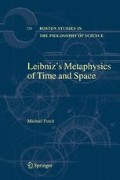In this chapter we explore Leibniz’s views on whether or not time has either a beginning or an end, paying particular attention to what Leibniz has to say about the possibility and actuality of an infinite temporal regress. For Leibniz, this question is tantamount to the question of whether or not the world has a beginning, or whether or not there is a first instant of time. As we have seen in Section 1.3 of Chapter 1, many of Leibniz’s predecessors and contemporaries (and even successors) repudiated the possibility of an endless past because of its ostensible mathematical incoherency. Since an infinite past would require an infinite succession to be completed, the world – and time – must be of only finite duration in the direction of the past. As best as I can make out, this is not a view that Leibniz shares. On the interpretation defended here, Leibniz’s philosophy of mathematics, and particularly his views on infinity, provides him with firm grounds for asserting the possibility of an endless temporal regress; for Leibniz, the world’s eternity is not a metaphysical impossibility. Having shown that Leibniz allows for the possibility of infinite temporal regresses, I try to ascertain to what extent he is willing to say that the world’s history is in fact characterized by such a regress. As we will see, some texts point to a world with no beginning. Nonetheless, I argue that in his most deliberate and thoughtful writings, Leibniz contends that the beginninglessness of the world cannot be a priori established on philosophical grounds. Thus, just as Leibniz renounces attempts to demonstrate via reason alone that the world must have a beginning, so too does he disown arguments purporting to prove that the world cannot have a beginning.
Our exploration of Leibniz’s views on the boundedness of time will lead us into his writings on the boundedness of space. In Section 4.2 I will argue that Leibniz holds that the actual world’s space is unbounded, but that this is only an empirically contingent feature of this world. More precisely, space is not of necessity unbounded, and so there are possible worlds with unbounded space and possible worlds with bounded space also.
Access this chapter
Tax calculation will be finalised at checkout
Purchases are for personal use only
Preview
Unable to display preview. Download preview PDF.
Rights and permissions
Copyright information
© 2008 Springer Science + Business Media B.V
About this chapter
Cite this chapter
(2008). The Bounds of Space and Time. In: Leibniz's Metaphysics of Time and Space. Boston Studies in the Philosophy of Science, vol 258. Springer, Dordrecht. https://doi.org/10.1007/978-1-4020-8237-5_4
Download citation
DOI: https://doi.org/10.1007/978-1-4020-8237-5_4
Publisher Name: Springer, Dordrecht
Print ISBN: 978-1-4020-8236-8
Online ISBN: 978-1-4020-8237-5
eBook Packages: Humanities, Social Sciences and LawPhilosophy and Religion (R0)

